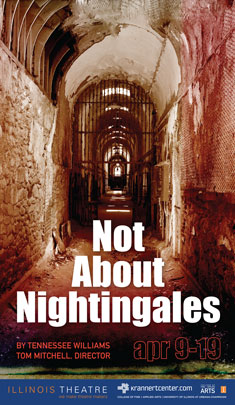 If American theatre had a Mount Rushmore, Tennessee Williams would be on it. And not just on it; he’d have the primo, George Washington spot. For this reason alone, any production of one of Williams’ plays is a big deal. Around here, though, there’s another reason to pay attention to a production of Williams’ work: Tom Mitchell. Mitchell has spent more time researching, contemplating, and staging the plays of Tennessee Williams than most people spend doing much of anything. And in his current production for Illinois Theatre, Williams’ nearly-lost prison drama Not About Nightingales, Mitchell’s care for, understanding of, and virtuosity with his chosen subject are on full display.
If American theatre had a Mount Rushmore, Tennessee Williams would be on it. And not just on it; he’d have the primo, George Washington spot. For this reason alone, any production of one of Williams’ plays is a big deal. Around here, though, there’s another reason to pay attention to a production of Williams’ work: Tom Mitchell. Mitchell has spent more time researching, contemplating, and staging the plays of Tennessee Williams than most people spend doing much of anything. And in his current production for Illinois Theatre, Williams’ nearly-lost prison drama Not About Nightingales, Mitchell’s care for, understanding of, and virtuosity with his chosen subject are on full display.
Written in 1938 when Williams was still a student and very early in his career, Not About Nightingales is a fantastic piece of theatre. (The story of how Vanessa Redgrave saved the play from obscurity and spearheaded its revival in 1998 is pretty well known. If you haven’t heard it, you can look it up here.) In it, a group of prison inmates stage a hunger strike to protest inhumane treatment — specifically the repetitive, unpalatable meals mandated by their malevolent warden. The inmates — led by alpha bully (and helpfully named) Butch — create such a sensation that, in an effort to thwart their protest, the warden confines them to a hot-box where four die.
As the inmates, Sam Babick (Butch), Ryan Leonard (Joe), David Mor (Queenie), Cory Sutton (Ollie), Donovan Diaz (Mex), Ninos Baba (Shapiro), Ryan Smetana (Swifty), and Samuel Janjay Knowlden (Canary Jim) are superb. These are the most cliché of characters, playing off both dramatic and racial stereotypes, and yet each actor manages to find the humanity within the caricature. Even those with minimal dialogue make resonant contributions to the whole. I was particularly drawn to the more “peripheral” of these characters, which is a testament to how lived-in and real each performance is.
In a play full of criminals, the true villain here is the brutal warden, Boss Whalen. As this relatively stock character, Jeremiah Lowry creates an indelible portrait of a smooth-talking sadist that is, dare I say it, a pleasure to watch. In just a few short months, Lowry has gone from the buttoned-up properness of Phileas Fogg (in Parkland’s Around the World in 80 Days, also directed by Mitchell) to an outsize portrayal of a real nasty sumbitch. Dynamite acting from a great talent. I hope to see him again soon.
As Boss Whalen’s most frequent verbal foil, the resident stool pigeon (or “canary”), Samuel Janjay Knowlden has tremendous stage presence. And although Jim’s romantic subplot with Whalen’s secretary Eva (Phallon Boyd) is underwhelming as written, both Knowlden and Boyd are credible and complex.
 Staged in the traverse or “alley” style, the set by Miguel Salazar makes brilliant use of a narrow strip of stage to create three distinct playing areas. Also critical in building this world is Michelle Benda’s precise lighting and the jarring sound design of Cynthia Booker. We are shunted (sometimes harshly) from the minimalist cellblock to the detail-specific office, from ethereal dream-state to hellish punishment, and we never doubt the sincerity of the pretend world before our eyes.
Staged in the traverse or “alley” style, the set by Miguel Salazar makes brilliant use of a narrow strip of stage to create three distinct playing areas. Also critical in building this world is Michelle Benda’s precise lighting and the jarring sound design of Cynthia Booker. We are shunted (sometimes harshly) from the minimalist cellblock to the detail-specific office, from ethereal dream-state to hellish punishment, and we never doubt the sincerity of the pretend world before our eyes.
This is excellent storytelling, from the tragic arc of the inmates (and fate of Boss Whalen) to the choreography of the out-of-spotlight transitions. Every detail put forth, from the verbal inflections to the occasional brutality (shout-out to fight choreographer Robin McFarquhar) moves the plot toward its grim resolution.
In telling you how good I think this production is, I hope also to convey how much I appreciate that it is good. Let me explain…
For most of my adult life I’ve had an on-again/off-again relationship with Tennessee Williams. I think this is pretty common for anyone who has ever been an actor, a director, a playwright, or a regular attendee of live theatre. Most actors who only know the big three or four in the Williams canon would demur to his greatness, secretly hoping the day would come when he or she might get to play Stanley or Maggie the Cat. Most directors would like the look of a Williams play on their resume.
There’s no way around it: Williams done well is sublime. It is poetic and ugly; it is passionate and inevitable. There are few surprises in a Williams play, perhaps, but there are many wonders. So why the “off-again” part? Because Williams done badly is about as bad as it gets. Bad southern accents, over-the-top belles and brutish rednecks. You get the idea. I’ve seen it done; you’ve seen it done. It’s painful.
For that matter, so are most plays that trip all over themselves while trying to bring attention to a social issue. While other plays (including very recent scripts that purport to be “timely” or “powerful”) attempt to beat social issues into audiences’ heads with a style I can only describe as “I’m sad NOW I’M YELLING,” Williams’ lyrical, character-driven “living newspaper” from 1938 feels subtle and incredibly contemporary. This is due not only to a superior playwright’s hand, but also to the hard work and talent of Mitchell, his crew, and his wonderful cast.
Not About Nightingales will continue to play in Krannert Center’s Studio Theatre until April 19th. If you have any interest in seeing great theatre done well, make plans to see it.








